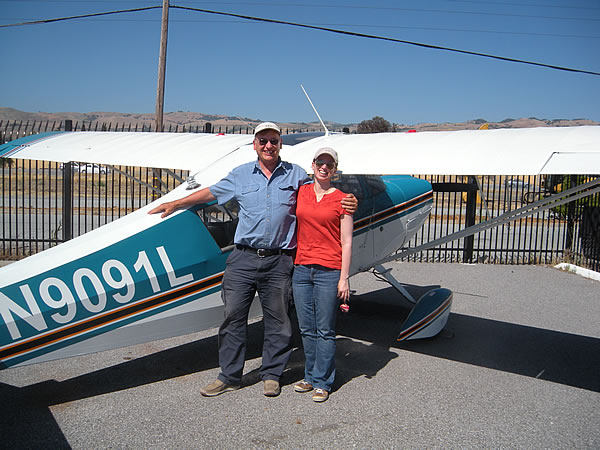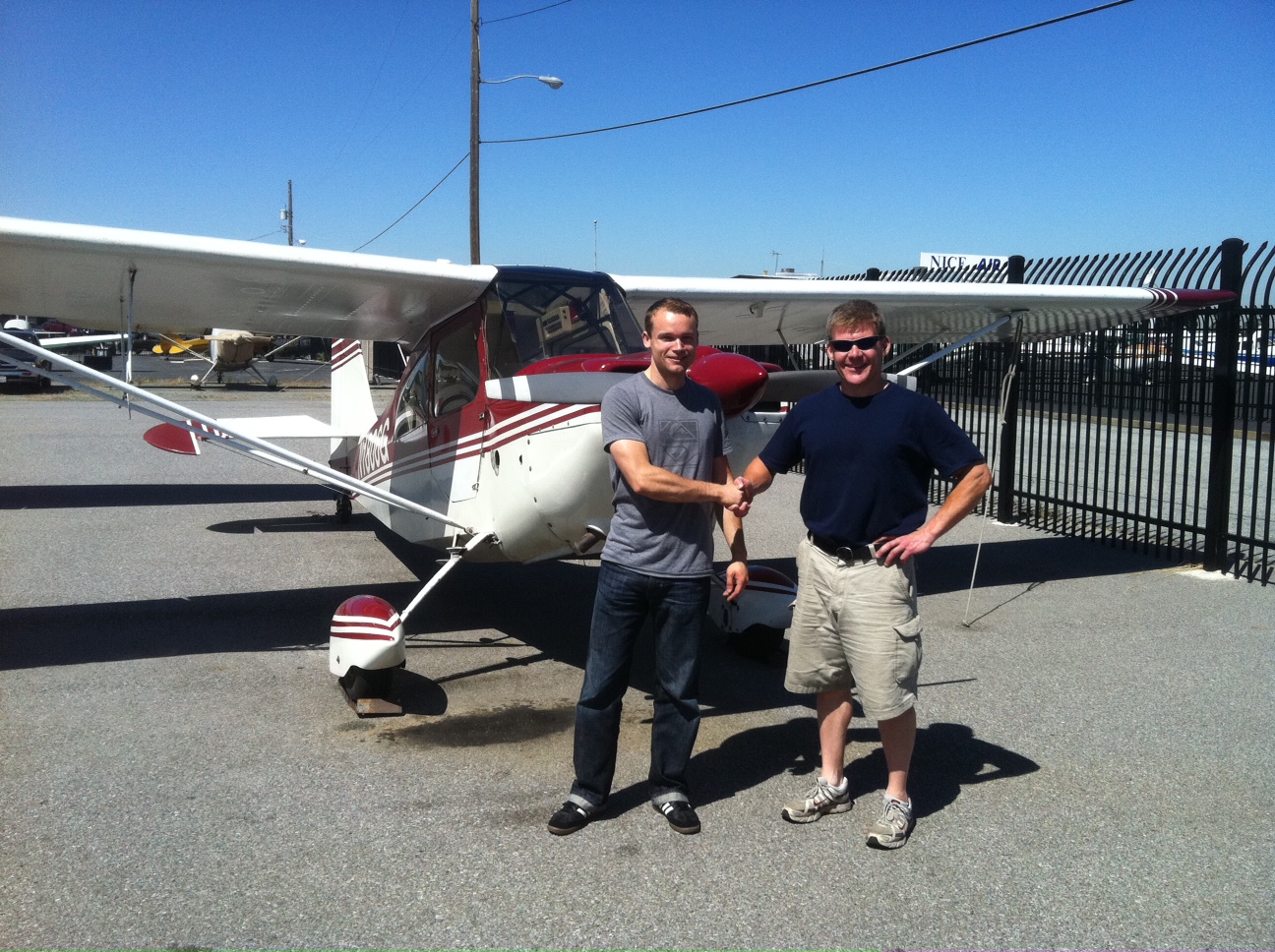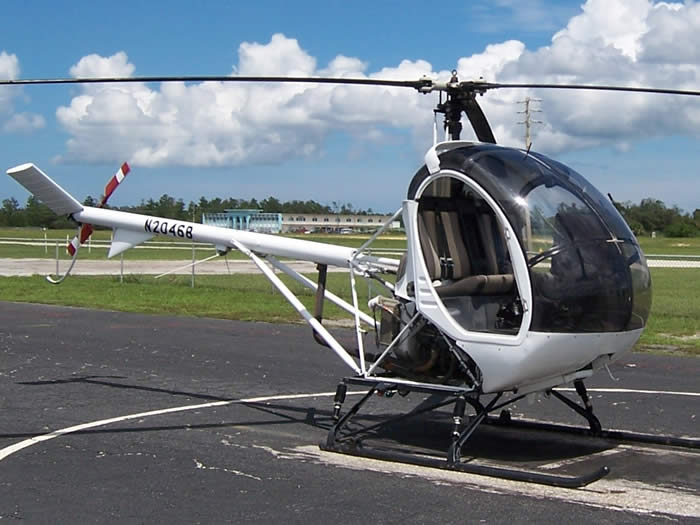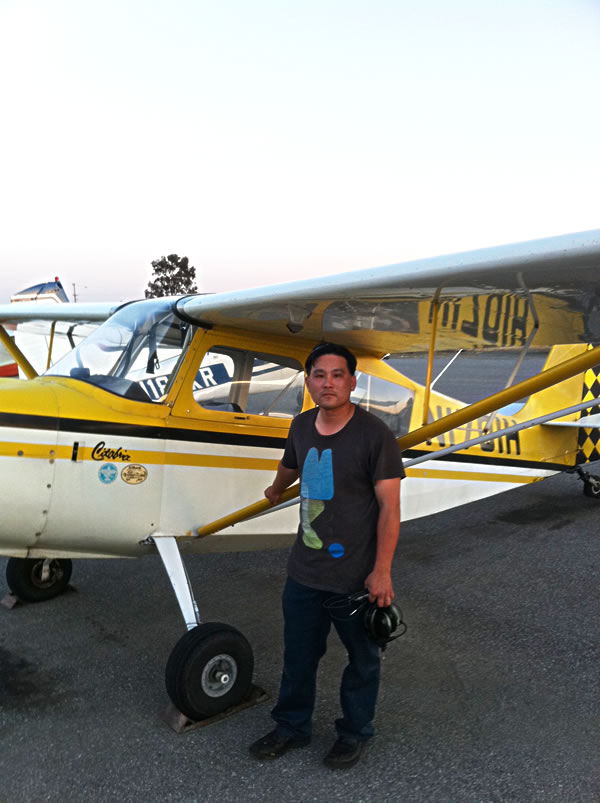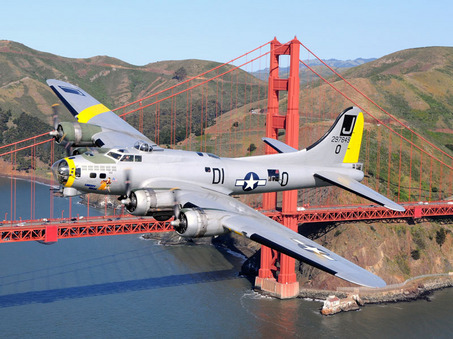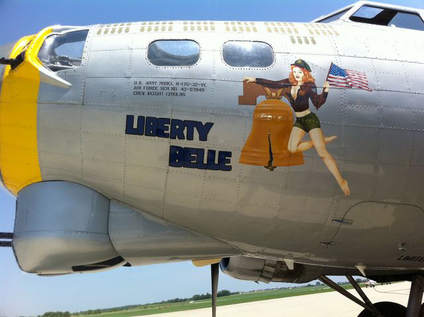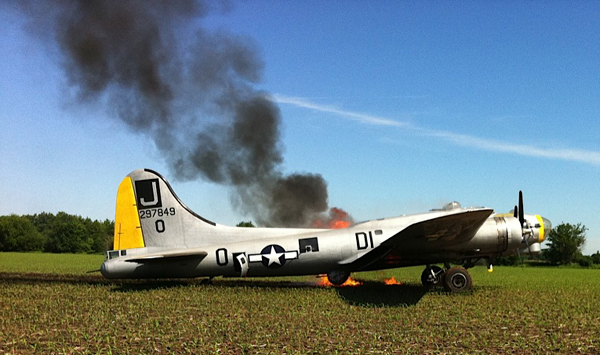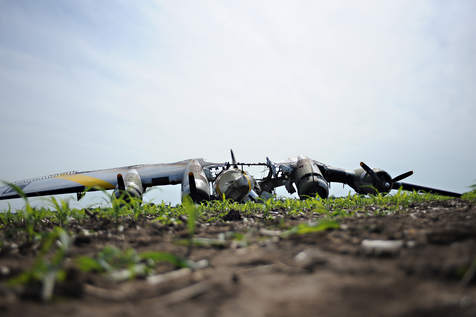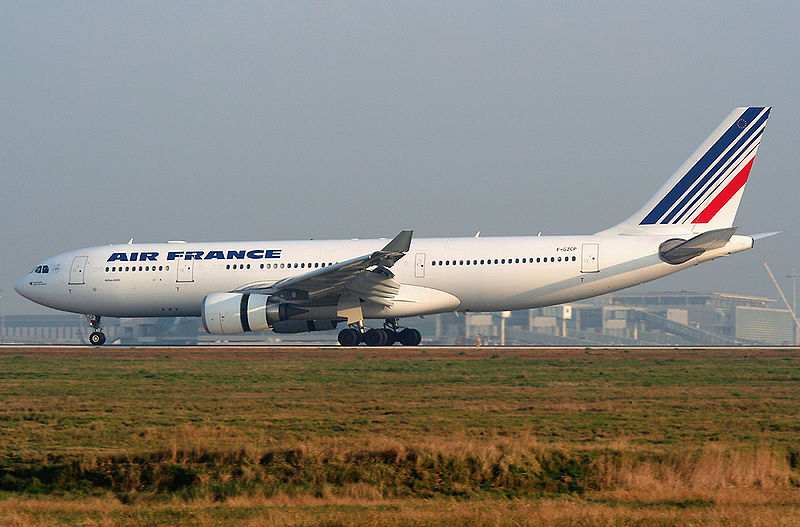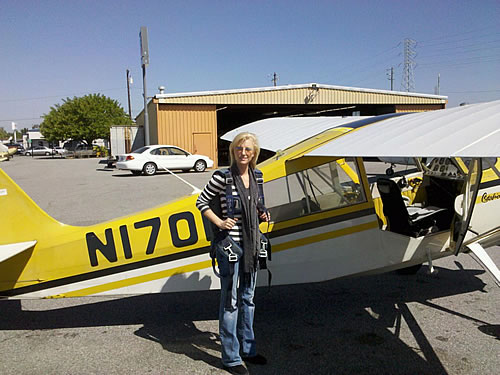Terrance Low
posts by author
New Taildragger Pilot: Loree Hirschman
Jul 01 2011Congratulations to Loree Hirschman who added tailwheel skills to her repertoire. Loree was a Naval Aviator, flying F-18s and S-3s off carriers in the Persian Gulf, and then switched to civilian life, but she still loves flying and being a pilot. We are delighted that she chose us to get her tailwheel training.
Loree also has her own Web site and check out also Youtube for some videos of flying in the Gulf. That’s her in the S-3 waving on the F-18 driver.
Going Solo: Anton Likhtarov
Jun 27 2011Another fledgling leaves the nest! Congratulations to Anton Likhtarov who soloed Citabria 1806G under Erik Schmidt’s careful guidance.
Well done Anton and Erik.
New Helicopter Pilot – Dick Chang
Jun 26 2011Congratulations to our own AeroDynamic CFI Dick Chang, who added a Rotorcraft-Helicopter rating to his pilot license recently.
Dick trained at Bristow Academy in Concord, flying the Schweizer 300, and then aced his checkride with Examiner Ken Suzuki.
Well done Dick!
New Taildragger Pilot: Jimmy Shih
Jun 18 2011Congratulations to Jimmy Shih who flew a Citabria solo for the first time after being let loose by his instructor Rimas.
Jimmy is already an acomplished pilot, and he wanted to add taildragging to his skills because his next flying ambition is aerobatics.
Go Jimmy!
News: B17 Liberty Belle Fire – as told by the Chief Pilot
Jun 16 2011From: Ray Fowler
The Liberty Foundation, Chief Pilot
|
First, let me start off by sincerely thanking everyone for the outpouring of support that we are receiving. I am sorry that I have not yet had the opportunity to return the many phone calls, text or e-mails that I am receiving offering to help. Again, thank you for all of the kind words that we are receiving and for incredible offers to help emotionally, financially and/or with the recovery process. I hope this statement will help fill in a few details that everyone is wondering about that led to the loss of our “Liberty Belle”.Yesterday morning, both our P-40 and B-17 were scheduled to fly from Aurora, Illinois to Indianapolis, Indiana. We were in Aurora for the weekend as a part of our scheduled tour. Over the course of the previous week, we completed a scheduled 25-hour inspection on the B-17 which was completed by Saturday. On Saturday, the weather stayed below the required ceiling to give any passenger flights, however the B-17 flew in the morning on a routine training proficiency flight, performing several patterns. Following the flight, other maintenance issues arose that required us to cancel our Sunday flying schedule for repairs. The maintenance performed has not been, in any way, associated to the chain of events that led to Monday’s fateful flight, but is being considered in the preliminary investigation. However, due to the media’s sensational (mis)reporting, there is a large amount of misinformation that continues to lead the news.
The news misidentified the P-40 as flying chase during the accident. I was flying our P-40, however I had departed 20 minutes prior to the B-17’s takeoff on the short flight to Indianapolis to setup for the B-17’s arrival. The aircraft flying chase was a T-6 Texan flown by owner Cullen Underwood. Cullen is one of our rated B-17 Captains and an experienced aviator tagging along as a support ship. The takeoff of both aircraft was uneventful and proceeded on-course southeast. Prior to exiting Aurora’s airport traffic area, the B-17 crew and passengers began investigating an acrid smell and started a turn back to the airport. Almost immediately thereafter, Cullen spotted flames coming from the left wing and reported over the radio that they were on fire. As all pilots know, there are few emergency situations that are more critical than having an in-flight fire. While it is extremely rare, it can (and sometimes does) indiscriminately affect aircraft of any age or type. In-flight fires have led to the loss of not only aircraft, but often can result in catastrophic loss of life. It requires an immediate action on the flight crew, as the integrity of aircraft structure, systems and critical components are in question. Directly below the B-17 was a farmer’s field and the decision was made to land immediately. Approximately 1 minute and 40 seconds from the radio report of the fire, the B-17 was down safely on the field. Within that 1:40 time frame, the crew shutdown and feathered the number 2 engine, activated the engine’s fire suppression system, lowered the landing gear and performed an on-speed landing. Bringing the B-17 to a quick stop, the crew and passengers quickly and safely exited the aircraft. Overhead in the T-6, Cullen professionally coordinated and directed the firefighting equipment which was dispatched by Aurora Tower to the landing location.
Let me go on the record by thanking the flight crew for their professionalism. Their actions were nothing short of heroic and their quick thinking, actions and experience led to a “successful” outcome to this serious in-flight emergency. John and Bud (and Cullen) did a remarkable job under extreme circumstances and performed spectacularly. While the leading news stories have repeatedly reported the “crash” of our B-17, fact is they made a successful forced landing and the aircraft was ultimately consumed by fire. Airplanes are replaceable but people are not and while the aircraft’s loss is tragic, it was a successful result. This leads me into discussing the exceptional safety record of the Boeing B-17 and to hopefully squash the naysayers who preach we should not be flying these types of aircraft. Since we first flew the “Liberty Belle” in December of 2004, we have flown over 20,000 passengers throughout the country and if you count our historic trip to Europe in 2008, worldwide. Of the other touring B-17s, some of which that have been touring for over 20 years, they have safely flown hundreds of thousands of people. The aircraft’s safety record is spectacular and I am certain the overall cause of our issue, which is under investigation, will not tarnish that safety record. In fact, as many of you know, other B-17 have suffered significant damage (although not as bad as ours!), only to be re-built to fly again. From a passenger carrying standpoint, I can think of few aircraft that offer the same level of safety as the 4-engine “Flying Fortress”. As mentioned earlier, in-flight fires are extremely rare and certainly could affect any powered aircraft under certain circumstances. I would put my children today in any of the other touring B-17s to go fly. I suggest to anyone that was thinking of doing so when a B-17 visits your area to do so without giving our loss any thought. There is wild speculation going on as to the cause of our fire and the affect to other operators. Please let the investigation run its course and report the findings. The NTSB and FAA were quickly on the scene and we are working closely with them to aid in the investigation. As soon as we receive some additional information, we will release it via the website http://www.libertyfoundation.org/. The ultimate question remains, where does the Liberty Foundation go from here? After the investigation and recovery, we will determine our options. We are still committed to the restoration and flying of World War II aircraft. Again, we appreciate the support and people offering to help get us back flying. Please check back for updates. I will close by thanking everyone that made our tour so successful. From the first day of the B-17’s restoration, thank you for all of you who labored to get her flying over the initial restoration years and to everyone that has worked on her out on tour since. Thank you to the crewmembers, tour coordinators and volunteers who gave up weekends and countless hours to support her on the road. And finally, thank you to the passengers, donors and media patrons that flew aboard and everyone who supported our cause. Hopefully, this will not be the end of the story, but a new beginning. Regards, Ray Fowler
|
Air France 447 – Plane or Pilots?
Jun 03 2011
Much has been said about how the pilots of AF reacted incorrectly to an impending stall, but did they really? It would appear that initially maybe they did raise the nose, but it also seems the plane’s autotrim then kept the nose up despite efforts to get it back down. However, there should have been plenty of time and altitude to recover. As has been mentioned elsewhere, the plane was not in a departure from controlled flight, it held the nose up accurately and the wings responded to roll inputs. So why did it stay nose up for what must have been a terrifying three minutes? Why, even after the Captain entered the cockpit and commanded nose down, did the nose stay up?
Here’s an analysis from Der Spiegel that raises disturbing questions about the airplane’s control systems. I thought it was interesting enough to post the whole article rather than just a link, but you can also click on image above to go to Der Spiegel web site:
New Taildragger Pilot: Andrea Dworshak
Jun 03 2011Andrea is working on her instrument rating and decided that taming a taildragger would make a nice break.
Not only did she tame a taildragger in two thirds of average time, but then she also took on some aerobatics. Well done Andrea and AeroDynamic CFI Mark Guerrero.
Going Solo: Stephane Dahan
Jun 03 2011Another fledgling flies solo! Congratulations to AeroDynamic member Stephane Dahan who is training with CFI Mark Guerrero.
Stephane flew three great takeoffs and landings in a Citabria on his own while Mark watched from the ground. Well done Stephane and Mark!
Going Solo: Chris Barcelona
May 22 2011Another fledgling leaves the nest! Congratulations to Chris Barcelona who soloed Champ 2791E while Blake watched anxiously from the ground. Several excellent takeoffs and landings later Chris was safely back with a gigantic grin on his face.
Well done Chris and Blake.
News: Fly to McClellan and listen to General Chuck Yeager talk!
May 19 2011It does not happen very often, so when he choses to talk it is worth listening. The legendary pilot and the first man to break the sound barrier is giving a talk in nearby Sacramento, and you can fly in to hear him!
When: Sunday, June 12, 2011 at 2:30 PM
Where: right on McClellan field (MCC)
Aerospace Museum of California
3200 Freedom Park Drive
McClellan, CA 95652
General Yeager will share some of his experiences and how the lessons learned apply to flight safety. Note: This event has a modest cost that includes admission to the museum. Please access the Aerospace Museum of California website http://www.aerospaceca.org for admission cost and other information. To assure seat availability and Wings credit register online at faasafety.gov
To view further details and registration information for this seminar, click here.
And wait, there’s more! This seminar also counts as one credit towards the FAA WINGS Safety program.
Book now, reserve a plane and listen to a living legend!


